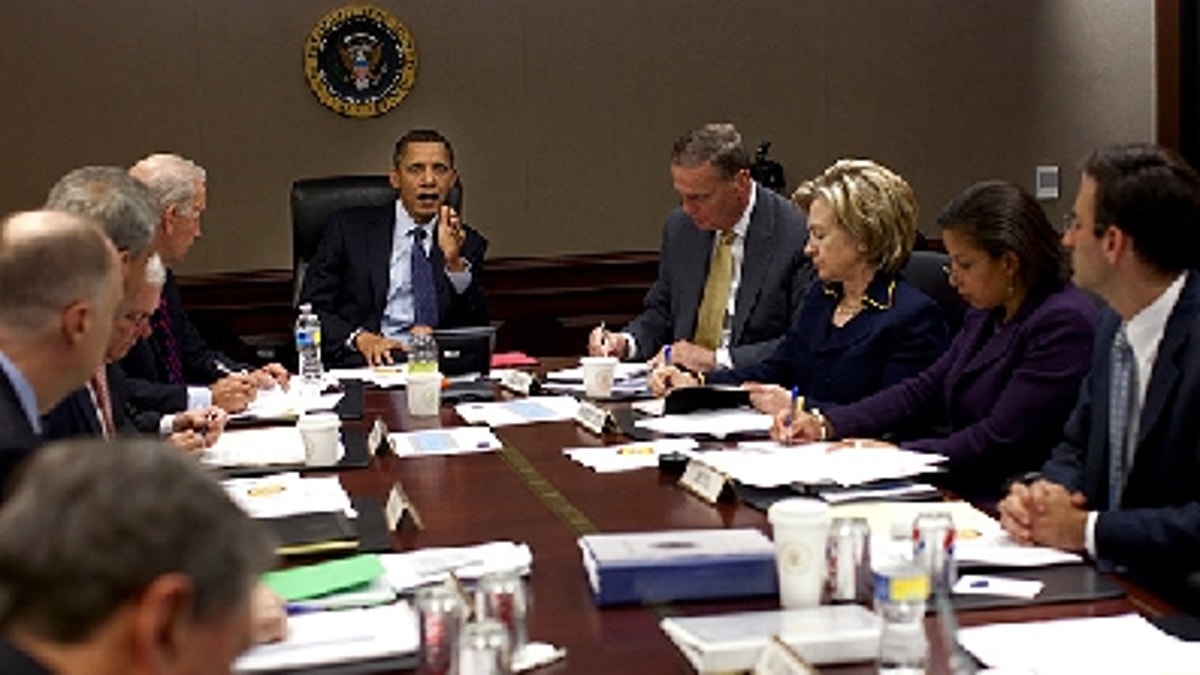
Nov. 23: President Obama holds a meeting on Afghanistan in the Situation Room. (Pete Souza, White House)
President Obama will announce Tuesday night that he is sending 30,000 more U.S. troops to Afghanistan to be deployed over the next six months, and set a goal of turning over security to Afghan forces beginning in July 2011.
Obama will set this as a goal to transition from ISAF forces to Afghan forces in security areas outside Kabul, according to a senior administration official speaking on background.
The president will not specify the end date, which the official said will be dictated by situation on the ground, but Obama's new approach will call for surge to reverse Taliban momentum, secure key population centers, train Afghans and transfer security to the Afghans.
Military officials said at least one group of Marines is expected to deploy within two or three weeks of Obama's announcement, and will be in Afghanistan by Christmas. Larger deployments won't be able to follow until early in 2010.
In a speech to be delivered at West Point, the president also plans to announce he will send another 300 civilians to Afghanistan to assist development efforts, boosting the total to 1,000.
At the start of the Obama administration the total civilian force was 320. Sixty percent of the nearly 700 added civilians will be outside Kabul and will aim to boost military, development and other contacts with provincial and district-level governments, side-stepping President Hamid Karzai.
The 30,000 new troops will bring the total in Afghanistan to more than 100,000 U.S. forces. The main mission of the new troops will be to reverse Taliban gains and secure population centers in the volatile south and east parts of the country. NATO diplomats said Obama also is asking European members of the military alliance to contribute between 5,000 and 10,000 new troops to the international force in Afghanistan.
Anti-war Democrats and liberals have been hammering the president for agreeing for the most part to a plan by Gen. Stanley McChrystal, the top commander in Afghanistan. But White House Press Secretary Robert Gibbs said that Americans will be pleased with the president's strategy, and its limited timeframe.
"The president will announce an acceleration of our training of Afghan national security forces both of army and a police because in the end the Afghan have to be responsible for providing their own security that's what's important," Gibbs told Fox News on Tuesday.
"This is not nation building and it's not an open-ended commitment," he said.
Without giving the timeline for deployment or the total number of troops ordered up, Gibbs said Obama's speech will lay out a faster deployment plan than initially envisioned in the war review written by McChrystal, who had sought 40,000 troops. Obama is hoping that NATO allies will contribute the deficit in troops.
The president's prime-time speech will speak only tangentially to the cost. Congressional Democrats have discussed placing a war tax on Americans that would exempt those making less than $30,000 but would impose a 1 percent tax on those earning more than $30,000.
Gibbs said the White House is not talking about that tax, but hasn't discussed strategy without addressing costs.
"Obviously, the cost of our endeavor in in Afghanistan, as in Iraq and throughout the world, has been discussed in these meetings. The president would never make a national security decision to protect the men and women of our own homeland based on a budget figure, but I will tell you this, guys, we are not going to and we can't afford to pretend that these wars do not cost money," Gibbs said.
Support for continued fighting in Afghanistan has been mixed, with 42 percent of 900 likely voters in a recent Fox News-Opinion Dynamics poll saying they backed sending more troops while 45 percent opposed it and 12 percent said they didn't know. The Nov. 17-18 poll had a margin of error of 3 percent.
Gibbs said the president has often made decisions that aren't "wildly popular" among Americans, but that the president is making a decision that is "in the best interest of our national security."
"We have to have an end game. "We're not going to be there forever. We don't have the manpower and the resource of our men and women in uniform to be there forever, but this isn't a political decision, this isn't a budgetary decision," he said.
Obama began rolling out his decision Sunday night, informing key administration officials, military advisers and foreign allies in a series of private meetings and phone calls that stretched into Monday.
Anit-war groups, however, are continuing to protest, hosting events in 42 cities on Tuesday to demonstrate against the president's decision.
Fox News' Major Garrett and The Associated Press contributed to this report.












































